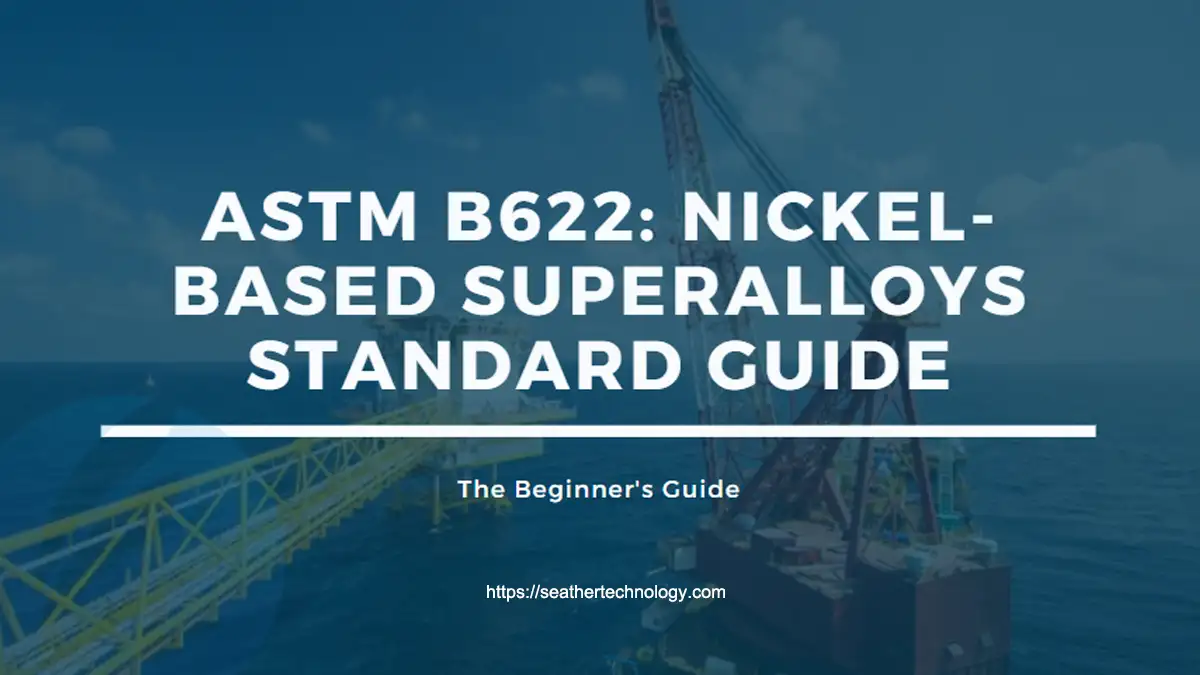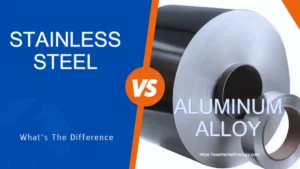ASTM stands for American Society of Testing Material, and B622 is ASTM’s approved standard for manufacturing nickel based alloys seamless pipes.
This standard covers all the important features of nickel based alloy seamless pipe, such as mechanical properties, heat treatment, chemical composition, and inspection.
The pipes and tubes of this standard have no seams and are welded throughout the structure; therefore, structural strength is uniform.
The standard is used in a wide range of applications such as aerospace, petrochemical, chemical, pharmaceutical, electric power, fertilizer, and other industries.
In this guide, we will look at several major components of ASTM B622 that you can use as an outline when choosing materials.
Grades & Chemical Composition
Grades
ASTM B622 includes a total of 32 nickel based alloy grades.
However, only the 12 most widely used grades are described here.
Furthermore, grade 686 is the only alloy covered by this standard.
The majority of the grades in ASTM B622 have molybdenum as a common feature. The molybdenum element provides the alloy with an unusually great resistance to reduction corrosion.
At the same time, the element molybdenum has an excellent solid solution-strengthening effect. As a result, these alloys frequently have good overall corrosion resistance and great strength.
The most widely used grades are given below:
Chemical composition of ASTM B622
Alloy Grades | Ni % | Cr % | Fe % | Co % | Mo % | W % | Ti % | Al % | Mn % | Others % |
Inconel 686
| 49.5~62.9 | 19~23 | 5 | – | 15~17 | 3.0~4.4 | 0.02~0.25 | – | 0.75 | S0.02, Si 0.08 C 0.01, P 0.04 |
Hastelloy B | 58~64 | 1.0 | 4~6 | 2.5 | 26~30 | –
| – | – | 1.0 | V 0.2~0.4 S0.03, Si 1.0 P 0.04 |
Hastelloy B-2 | 65~74 | 1 | 2.0 | 1.0 | 26~30 | – | – | – | 1 | S 0.03, Si 0.10 C 0.02, P 0.04 |
Hastelloy B-3 | 65~71 | 1~3 | 1~3 | 3.0 | 27~32 | 3.0 | 0.20 | 0.50 | 3.0 | V 0.20 Ta 0.20 Nb 0.20 Cu 0.20 Zr 0.10 |
Hastelloy C-2000 | 51~61 | 22 ~
24 | 3.0 | 2.0 | 15~17 | – | – | 0.5
| 0.5 | S 0.01, Si 0.08 C 0.01, P 0.025 |
Hastelloy C-22 | 50~63 | 20 ~ 22.5 | 2.5 | 2~6 | 12.5~14.5 | 2.5~3.5 | – | – | 0.5 | S 0.020, V 0.35 Si 0.08 C 0.015, P 0.020 |
Hastelloy C-276 | 51~63 | 14.5~16.5 | 4~7 | 2.5 | 15~17 | 3~4.5 | – | – | 1.0 | V 0.35 S 0.03, Si 0.08 P 0.04 |
Hastelloy C-4 | 58.2~ 72 | 14~ 18 | 3.0 | 2.0 | 14~17 | – | 0.70 | – | 1.0
| S 0.03, Si 0.08 C 0.015, P 0.040 |
Hastelloy X | 41.3~ 53.7 | 20.5~23 | 17~ 20 | 0.5~ 2.5 | 8~10 | 0.2~1 | 0.15 | 0.5 | 1.0 | Nb 0.5 S 0.03, Si 1.0 P 0.04 |
Hastelloy G-3 | 36.9~ 45.4 | 21~ 23.5 | 18~ 21 | 5 | 6~8 | 1.5 | – | – | 1 | Nb+Ta 0.5 Cu 1.5~2.5 S 0.03, Si 1.0 P 0.04 |
Hastelloy G-30 | 30.2~ 47.2 | 28~ 31.5 | 13~ 17 | 5 | 4~6 | 1.5~4 | – | – | 1.5 | Nb+Ta 0.3~ 1.5 Cu 1.0~2.4 S 0.02, Si 0.8 P 0.04 |
Hastelloy G-35 | 51.5~ 60.1 | 32.3~34.3 | 2.0 | 1.0 | 7.6~9 | 0.6 | – | 0.40 | 0.5 | V 0.20 Cu 0.30 S 0.015, Si 0.6 P 0.03 |
Product Properties
Products in ASTM B622
The ASTM B622 standard exclusively includes the seamless pipe and tube.
Seamless pipes are pipe/tube materials that do not have welds.
It is typically manufactured by cold drawing or cold rolling.
It has a higher pressure-bearing capability than welded pipes because there are no welds.
The wall thickness of the seamless pipes is normally not excessively thin as a result of the manufacturing process.
The specification defines that seamless pipe has an outside diameter greater than 88.9mm.
A seamless tube has an outer diameter of less than or equal to 88.9mm.
All the given ASTM B622 grades have the same products like Inconel 686, less pipe and tube, and Hastelloy B seamless pipe and tube.
Mechanical Properties
ASTM B622 alloys are solid solution-strengthened alloys.
These alloys have excellent strength among solid solution-strengthening alloys because they contain the ideal solid solution-strengthening elements such as tungsten and molybdenum.
The mechanical properties of commonly used grades of nickel-based alloy are given in the table:
Alloy Grades | Tensile strength Min (MPa) | Yield strength (0.2% offset) Min (MPa) | Elongation in (50.8mm) min % |
686
| 690 | 310 | 45 |
B | 690 | 310 | 40 |
B-2 | 760 | 350 | 40 |
B-3 | 760 | 350 | 40 |
C-2000 | 690 | 310 | 45 |
C-22 | 690 | 310 | 45 |
C-276 | 690 | 283 | 40 |
C-4 | 690 | 276 | 40 |
X | 690 | 276 | 35 |
G-3 | 621 | 241 | 40 |
G-30 | 586 | 241 | 30 |
G-35 | 586 | 241 | 30 |
Delivery State
Following the basic standard ASTM B622, all seem less pipes must be delivered in the solution treatment state.
This is the alloy’s ideal combination of strength and toughness.
The seamless pipe in the state of solution treatment has the longest service life during usage.
Furthermore, most seamless pipes require surface treatment, such as polishing or pickling after heat treatment.
This is carried out to eliminate the scale that forms during heat treatment.
Other Information
Dimension
The dimensions table (Pipe Schedules) of seamless pipes is listed in the appendix of the ASTM B622 standard.
The given table size is optional. However, dimensions other than those in the table are also acceptable.
In reality, this given table belongs to ASME B36.10. In practice, the size of the seamless pipe can be modified by ASME B36.10 and ASME B36.19.
Pipe Schedules Table
Nominal Pipe Size, in. | Outside Diameter mm | Nominal wall thickness
Schedule No. 10 | Nominal wall thickness
Schedule No. 40 | Nominal wall thickness
Schedule No. 80 |
1⁄4 | 13.72 | 1.65 | 2.24 | … |
3⁄8 | 17.14 | 1.65 | 2.31 | 3.20 |
1⁄2 | 21.34 | 2.11 | 2.77 | 3.73 |
3⁄4 | 26.67 | 2.11 | 2.87 | 3.91 |
1 | 33.40 | 2.77 | 3.38 | 4.55 |
1-1⁄4 | 42.16 | 2.77 | 3.56 | 4.85 |
1-1⁄2 | 48.26 | 2.77 | 3.68 | 5.08 |
2 | 60.32 | 2.77 | 3.91 | 5.54 |
2-1⁄2 | 73.02 | 3.05 | 5.16 | 7.04 |
3 | 88.90 | 3.05 | 5.49 | 7.62 |
Hydrostatic Test
This standard requires each seamless pipe to be hydrostatically tested by following the ASTM B829.
Hydrostatic testing at pressures more than 1000 psi may also be agreed upon between the purchaser and the manufacturer.
Conclusion
The ASTM B622 standard pipes are most widely used in the industry due to their excellent corrosion resistance strength, and seem less properties in extreme environmental conditions.
These pipes are commonly used in petrochemical, chemical aerospace, fertilizers, pharmaceutical, and power industries.
We deal in all grades of seamless pipes. If you want to get more information about nickel-based superalloys pipes and customized products, please get in touch with us.






